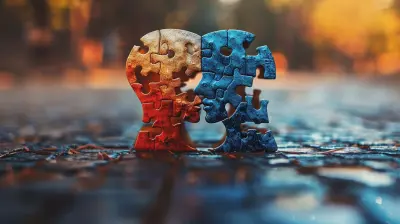The Science Behind Attachment Theory: What Research Tells Us
13 June 2025
Have you ever wondered why some people form close relationships easily while others struggle to connect? Or why some individuals seem to be naturally trusting, while others are more guarded and distant? Well, much of the answer lies in something called Attachment Theory. It's a concept rooted in psychology that explores how the bonds we form in early life shape our emotional development, relationships, and even our mental health. Sound intriguing? Let’s dive deeper into this theory and see what research tells us about it.
What Exactly Is Attachment Theory?
Attachment theory is like a blueprint for understanding human connection. It was first introduced by British psychologist John Bowlby back in the 1950s. Bowlby believed that the bonds formed between infants and their primary caregivers (usually their parents) lay the foundation for how we build relationships throughout our lives. These early attachments determine whether we feel secure or insecure in our relationships as adults.Think of attachment as the emotional glue that binds us to others. It’s a biological instinct, deeply wired into our brains, that helps us seek closeness, security, and comfort from those we care about. When we feel connected and supported, we thrive emotionally. When those connections are broken or inconsistent, it can affect our sense of security and self-worth.
The Four Types of Attachment Styles
Researchers have identified four primary attachment styles, each of which reflects how individuals respond to relationships based on their early life experiences. Let’s break them down:1. Secure Attachment
People with a secure attachment style are basically the relationship rockstars. They’re comfortable with intimacy and trust, and they tend to have healthy, balanced relationships. This style typically develops when a child has consistent and responsive caregivers who provide love and support.A securely attached person knows, deep down, that they can rely on others when needed. They value close relationships but aren’t overly dependent on them for validation. In short, they know how to connect without becoming clingy or fearful of abandonment. Sounds ideal, right?
2. Anxious-Preoccupied Attachment
If you’ve ever known someone who constantly worries about being left or not being loved enough, they might have an anxious-preoccupied attachment style. These individuals crave closeness but are often overwhelmed by fears of rejection or abandonment. This style usually stems from inconsistent caregiving during childhood, where love and attention were unpredictable.People with this attachment style often feel insecure and may come across as needy or overly dependent in relationships. They want affirmation but may struggle to trust that their partner truly cares for them.
3. Dismissive-Avoidant Attachment
On the flip side, people with a dismissive-avoidant attachment style tend to shy away from emotional intimacy. They value independence and self-reliance to the point of avoiding close relationships altogether. This attachment style often forms when caregivers are emotionally distant or unresponsive in childhood.These individuals may have learned to suppress their needs for connection, convincing themselves that they don’t need others. While they appear emotionally self-sufficient, underneath that tough exterior might lie a fear of vulnerability and commitment.
4. Fearful-Avoidant (Disorganized) Attachment
Finally, we have the fearful-avoidant attachment style, which is perhaps the most complicated of them all. People with this attachment style crave intimacy but are simultaneously terrified of it. It’s like being caught in a tug-of-war between wanting connection and fearing emotional pain.This attachment style often results from trauma or abuse in childhood, where caregivers were both a source of fear and comfort. Individuals with this style may struggle with trust, have low self-esteem, and struggle to form stable, long-lasting relationships.
The Neuroscience Behind Attachment
So, what’s happening in our brains when we form these attachment patterns? It turns out that attachment is not just a psychological phenomenon; it’s deeply rooted in our biology.The Role of Oxytocin
One of the key players in the attachment process is a hormone called oxytocin, often referred to as the "love hormone" or "bonding hormone." Oxytocin is released during moments of closeness, like when a mother holds her baby or when partners show affection toward one another. It promotes feelings of trust, attachment, and bonding. Essentially, oxytocin helps us feel connected to others.But here’s the kicker: early life experiences can influence how our brain responds to oxytocin later in life. If our early attachments were loving and secure, our brain produces more oxytocin in relationships, making us more likely to trust and bond with others. On the flip side, if our early attachments were inconsistent or traumatic, our brain may produce less oxytocin, making it harder for us to feel secure in relationships.
The Fight-or-Flight Response
Another key biological component of attachment is the fight-or-flight response, controlled by the brain's amygdala and the autonomic nervous system. When infants feel safe and secure with their caregivers, their fight-or-flight response remains calm. However, when they’re exposed to inconsistent or neglectful care, this system can become hyperactive. As adults, individuals with insecure attachment styles may experience heightened anxiety and stress in relationships, as their brain is conditioned to anticipate rejection or abandonment.
How Research Has Evolved Over Time
While Bowlby laid the groundwork for attachment theory, it was Mary Ainsworth, a Canadian-American psychologist, who expanded on his ideas through her famous Strange Situation Experiment in the 1970s. This study observed how infants reacted when separated from their caregivers and then reunited with them.Ainsworth’s research confirmed Bowlby’s hypothesis that early attachment styles significantly shape our relationships in adulthood. Her work showed that securely attached infants were more likely to explore their environment and return to their caregivers for reassurance. In contrast, insecurely attached infants displayed anxiety, avoidance, or confusion when faced with separation.
Since Ainsworth’s time, countless studies have continued to explore attachment theory across various cultures, ages, and types of relationships. Researchers have found that attachment styles influence not only romantic relationships but also friendships, work environments, and even parenting styles.
Can Attachment Styles Change?
You might be wondering, “Am I stuck with my attachment style for life?” Thankfully, the answer is no. While our early experiences shape us, they don’t define us forever. Our attachment style is not set in stone.Research has shown that attachment styles can change over time, especially through self-awareness, therapy, and healthy relationships. For example, someone with an anxious-preoccupied attachment style can learn to develop more secure attachment behaviors through experiences that promote trust and emotional safety. Similarly, those with avoidant styles can work on becoming more comfortable with vulnerability and intimacy.
It’s important to remember that attachment theory is not about labeling yourself or others. It’s simply a tool for understanding how you relate to others and how you might improve your relationships. And the best part? With effort and the right support, anyone can move toward a more secure attachment style.
Practical Ways to Develop a Secure Attachment Style
Now that we’ve explored the different attachment styles, let’s talk about how to cultivate a more secure attachment—whether you’re starting from scratch or trying to unlearn some old patterns. Here are a few practical tips:1. Build Self-Awareness
The first step to change is always awareness. Start by reflecting on your attachment style and how it affects your relationships. Journaling, mindfulness, or talking with a therapist can help you recognize your patterns and triggers.2. Communicate Openly
Securely attached individuals tend to communicate their needs and feelings openly. Practice being honest about your emotions with your partner, friends, or family. It might feel vulnerable at first, but it’s a crucial step toward building trust and intimacy.3. Cultivate Trust
Trust is the bedrock of secure attachments. To build trust in relationships, focus on consistency, reliability, and emotional availability—both from yourself and others. Remember, trust is built over time, one small action at a time.4. Seek Therapy or Counseling
If you find yourself trapped in unhealthy attachment patterns, seeking therapy can be incredibly helpful. Therapists trained in attachment theory can guide you through the process of healing past wounds and developing healthier relationship habits.Final Thoughts
The science behind Attachment Theory is both fascinating and deeply personal. It explains why we connect the way we do, how our early life experiences shape our adult relationships, and what we can do to foster healthier, more secure attachments. Whether you're someone who easily connects with others or someone who struggles with intimacy, understanding your attachment style is a powerful tool for personal growth.So, what’s your attachment style? And how will you use that knowledge to improve your relationships? Take a moment to reflect and consider how the science of attachment could help you create stronger, more fulfilling connections in your life.
all images in this post were generated using AI tools
Category:
Attachment TheoryAuthor:

Paulina Sanders
Discussion
rate this article
3 comments
Clara Diaz
Connections shape our existence.
June 21, 2025 at 3:39 PM

Paulina Sanders
Absolutely! Our connections significantly influence our emotional well-being and development, as attachment theory illustrates the vital role of relationships in shaping our lives.
Valeris Kirk
This article effectively distills the complexities of attachment theory, emphasizing its pivotal role in shaping interpersonal relationships. By integrating empirical research findings, it invites readers to reflect on their own attachment styles, ultimately fostering greater self-awareness and promoting healthier connections with others.
June 17, 2025 at 2:40 AM

Paulina Sanders
Thank you for your thoughtful comment! I'm glad to hear that the article resonated with you and provided valuable insights into attachment theory and its impact on relationships.
Anisa Larsen
Oh great, another article that explains why I’m emotionally attached to my cat more than to people. Because obviously, what I really needed was a scientific breakdown of my questionable life choices. Thanks for clearing that up! 🙄🐾
June 14, 2025 at 3:58 AM

Paulina Sanders
Thanks for your comment! It’s interesting how pets can provide such strong emotional connections. Sometimes, science helps us understand our feelings better, even if it feels a bit too analytical! 🐾❤️



